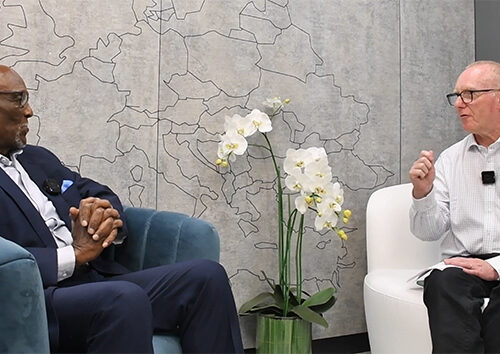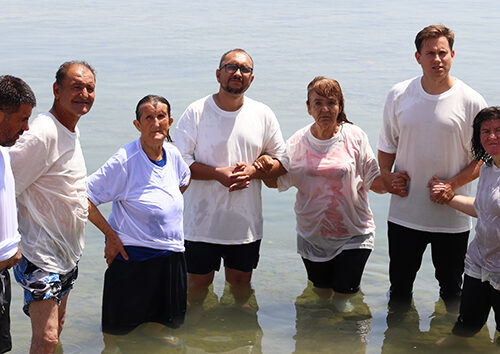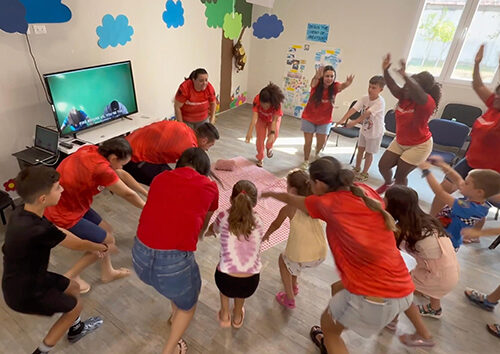6 August 2020 | St Albans, UK [tedNEWS/ANN]
Following a major explosion that killed at least 135 people and injured 4,000 more, citizens of the city of Beirut, Lebanon are left in shock and anger. The government has imposed a two-week state of emergency to help deal with the crisis following the blast caused by 2,750 tonnes of ammonium nitrate stored unsafely in a warehouse. According to Beirut’s governor, Marwan Aboud, the blast has left as many as 300,000 people homeless.
“Our prayers are with the people of Lebanon who were caught in this tragic incident and have endured and continue to endure so much hardship,” states Pastor Raafat Kamal, president of the Trans-European Division. “We express our deepest condolences following the shocking explosion in Beirut Port on Tuesday.”
Many staff and former missionaries across the TED know Lebanon well since it was a part of the TED until the Middle East and North Africa Union (MENA) was formed in 2011. That knowledge has intensified prayers and concern for a region that has seen more than its share of troubles over the years.
“This is a country on edge with economic insecurities, high unemployment and facing a second wave of COVID-19,” notes Kamal.
“The magnitude of the explosion is beyond belief,” he adds. “I lived through the civil war in Lebanon between 1975 to 1984 but saw nothing on this scale. Watching scenes of the explosion on my television screen has brought back the memories of the war including our house twice being hit by rockets and the loss of extended family and friends. I am in shock and call on our entire church family to pray for Lebanon at this difficult time.”
Members safe, buildings damaged
The Seventh-day Adventist Church in Lebanon is assessing damage and cleaning up following the 4 August explosion that rocked the capital at an estimated strength of 10 percent of the atomic bombs dropped on Hiroshima and Nagasaki at the end of World War II.
All Adventist workers and members have been accounted for and are safe, but some Adventist contacts have been injured.
 Leaders at MENA have confirmed damage to buildings on the Middle East University (MEU) campus—primarily windows blown out from the impact blast in homes, dorms, and classrooms, but also fallen ceilings. Similar damage was reported in the MENA Media Centre on the MEU campus.
Leaders at MENA have confirmed damage to buildings on the Middle East University (MEU) campus—primarily windows blown out from the impact blast in homes, dorms, and classrooms, but also fallen ceilings. Similar damage was reported in the MENA Media Centre on the MEU campus.
Two Adventist secondary schools in Beirut and the ADRA office were damaged as well. Hardest hit was the Boucherieh Adventist Secondary School where crews are cleaning up the debris from fallen windows and ceilings.
 Two Adventist churches located on the school campuses in Boucherieh and Mouseitbeh were also affected. Glass windows and doors were shattered, and volunteers have been carefully working to clean up the debris. The Adventist Learning Centre for refugees was also heavily damaged, affecting one of the ways the Church assists refugees in Lebanon.
Two Adventist churches located on the school campuses in Boucherieh and Mouseitbeh were also affected. Glass windows and doors were shattered, and volunteers have been carefully working to clean up the debris. The Adventist Learning Centre for refugees was also heavily damaged, affecting one of the ways the Church assists refugees in Lebanon.
“Our biggest concern right now is how Adventists can assist the people of Lebanon with hope and with practical help at this time. We want to show God’s love to this country at a time when many have lost hope,” says Rick McEdward, president of the church in the MENA region. “Church workers and members are looking for ways of being God’s hands and feet during this time through practical assistance in the most affected areas.”
Major challenge to economy, country, and church
 The impact of the explosion has left the downtown sector of Beirut devastated, and revived emotional scars from the civil war that devastated the country for many years.
The impact of the explosion has left the downtown sector of Beirut devastated, and revived emotional scars from the civil war that devastated the country for many years.
People around the world have offered support during this terrible crisis. The aftermath of the explosion is one of many blows that have impacted Lebanon over the past nine months.
In October dramatic protests rallied across Lebanon, eventually causing the Prime Minister to resign and a new government to be formed. The hope of national economic and infrastructure reforms faded as the Lebanese currency began to dive in its value; Lebanese citizens began losing hope.
From October until December, banks, schools, and offices were frequently closed due to the various protest movements, bringing the country to a standstill.
Then, just when Lebanon was beginning to reopen for ‘normal’ business, the world was hit with the COVID-19 pandemic, causing a government-mandated total lockdown, with eventual stages for reopening.
Adventist secondary schools in Beirut and the Adventist university completed the year with online learning. At the same time, Lebanon sank into an economic crisis that has seen rapid inflation and devaluation of the Lebanese currency.
Middle East University and the two K-12 schools in Lebanon have been reeling from the financial impact of the national economic crisis, multiplied by the COVID-19 lockdown.
Teachers at the two K-12 schools have been receiving only a portion of their salaries, and the schools are being forced into extreme measures to see if they will be able to reopen for the school year starting later this month.
 “This has been the perfect storm with crisis after crisis for Lebanon,” says Michael Wixwat, MENA treasurer.
“This has been the perfect storm with crisis after crisis for Lebanon,” says Michael Wixwat, MENA treasurer.
McEdward adds, “Lebanon is a country with an economy that is spiralling out of control, then COVID-19 hit with all the lockdowns further shutting down the economy, and now this devasting blast to the heart and infrastructure of Lebanon. The explosion gave yet another blow to our beloved institutions here in Lebanon.”
Institutions with limited financial resources are working to repair the damage at the University, secondary schools, and Learning Centre. The challenge of the greater Lebanon crisis has become the backdrop for many institutions in Lebanon to close their doors rather than reopening.
Prayer support is greatly appreciated for the church and the institutions that have been affected by the crisis in Lebanon and the recent explosion.
McEdward appeals, “Please pray for the church in Lebanon as it seeks to be a blessing and bring good news to the nation.”
The original version of this article appeared first on ANN, the Adventist News service.
tedNEWS Staff: Victor Hulbert, editor; Deana Stojković, associate editor
119 St Peter’s Street, St Albans, Herts, AL1 3EY, England
E-mail: [email protected]
Website: www.ted.adventist.org
tedNEWS is an information bulletin issued by the communication department of the Seventh-day Adventist Church in the Trans-European Division. Readers are free to republish or share this article with appropriate credit including an active hyperlink to the original article.



